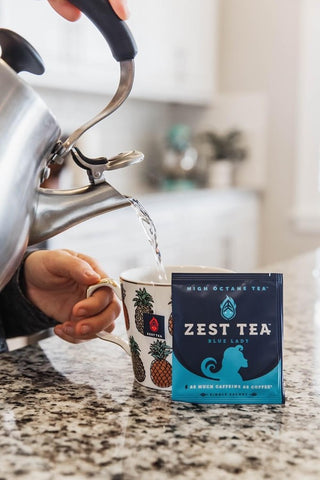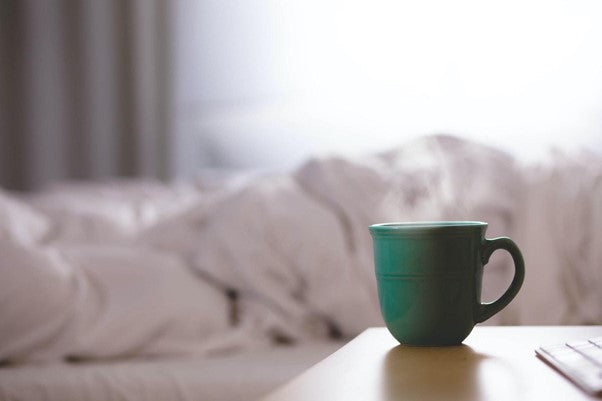The Best Tea for Hangover Symptoms
After a night out drinking, you're likely to wake up with some hangover symptoms. Whether it's a dull ache in your head or a full-body experience, a hangover cure sounds like just what you need. But is a caffeinated or herbal tea the solution?
In this article, we're exploring how the unique health benefits of tea could be used to soothe a hangover. You'll find the 5 best tea types (including Zest Tea blends and ultra hydrating electrolyte powder) to try when you have a hangover, plus 3 extra tips to boost your recovery.
What Is A Hangover?

Drinking alcohol is fun and even may have some surprising health benefits for your cardiovascular system, nervous system, and sensory organs (although separating the benefits from the harmful effects still needs to be worked on). But when you consume too much alcohol, the result is a "hangover".
Alcohol can irritate the stomach lining and digestive system, increase urination which leads to dehydration, increases overall inflammation, disrupts your sleep, and is metabolized into acetaldehyde (a toxic short-lived by-product) in the liver which contributes to further inflammation.
These effects of excessive alcohol use can result in a range of symptoms including:
- Muscle aches and pains,
- Fatigue, tiredness, and overall weakness,
- Headaches,
- Anxiety and irritability,
- Sensitivity to light and sound,
- Excessive thirst and a dry mouth,
- An upset or delicate stomach, stomach aches, and general discomfort throughout the digestive system.
Some people claim to not experience hangovers, while others will only experience a handful of symptoms. The duration of the hangover varies as well. Researchers have found that your susceptibility to alcohol hangovers is somewhat related to the strength of your immune system.
Do Hangover Teas Work?
Hangovers can last for over 24 hours, as your liver metabolizes the alcohol and your body expels the toxic by-products created. There's no cheat or cure in the form of herbal teas or food supplements that can skip over this process.
Although some teas have medicinal properties and perceived health benefits, there is no tea-based hangover cure that can contribute to liver detoxification either. Read our article concerning Weight Loss Detox Tea to learn more about what detoxifying entails.
Nonetheless, any tea lover will be able to tell you that some teas do have properties that may soothe the symptoms of a hangover. Whether you pick the best herbal tea from our list of teas below or opt for another favorite tea type, tea can help to rehydrate your body which will go a long way to reducing some of the symptoms listed above.
Tea isn't the only beverage that can aid with hangover symptoms. To combat the dehydration and ensure your body replenishes water and nutrients at a cellular level, explore our Hydration Powder Sticks next.
5 Teas That Soothe the Symptoms of a Hangover
We've established that there are no real hangover cures, however, there are some teas with properties that can soothe some individual or overall symptoms of a hangover. So, whether happy hour has just ended or you've woken up with a throbbing headache, try reaching for these best herbal teas instead of an instant coffee.
You can drink tea before your hangover develops, or when the symptoms are at their worst. The only way to prevent a hangover entirely is to avoid alcohol in the first place.
Green Tea

Green tea is a caffeinated tea type, so it's best to drink a cup the morning after instead of before bed, as it may contribute to sleep disturbance if you are particularly sensitive to caffeine. Regardless, green tea is a great source of antioxidants and a particular amino acid - L-Theanine.
L-Theanine in green tea has a calming effect. It enhances alpha waves which promote a feeling of calmness without causing any drowsiness. This tea type is also high in antioxidants including EGCG, which has anti-inflammatory effects.
We recommend drinking a cup of green tea, like our subtly sweet Superberry Samba, in the morning to ease anxiety, fatigue, and irritability. If you prefer a cold drink, then our zero-calorie Cucumber Melon ready-to-drink energy tea is also a good choice. It's made with green tea and plant-based non-GMO ingredients.
Black Tea

Black tea is one of the most popular teas to drink for a hangover, particularly in the UK where a hearty cup of black tea and a "full English" breakfast is considered the best hangover cure. While there's no scientific evidence that black tea is a hangover cure, it can go a long way towards easing some hangover symptoms.
Like green tea, black tea is a source of caffeine and L-Theanine to give your energy levels an extra boost while reducing fatigue and irritability. Furthermore, polyphenols in tea have a positive, prebiotic-like effect on overall gut health which is good news for your digestive system.
Blue Lady is our most popular black tea flavor. If you like to drink your black tea with milk (and perhaps a teaspoon of sugar or sweetener) then try our classic Earl Grey blend instead. Our black teas provide up to 150mg of caffeine per serving, so they're ideal for boosting your energy levels for exercise or a long day at work.
Ginger Tea

We highly recommend ginger tea for hangover symptoms. Ginger is known for its anti-nausea and anti-inflammatory properties. It's a popular remedy for morning sickness and the active ingredient, gingerols, are proven to reduce stomach upsets and reduce inflammation.
Our Spicy Masala Chai is one of the best teas for a hangover as it contains both ginger and black tea to soothe your symptoms. It also pairs well with a simple, carbohydrate breakfast (see further hangover tips below).
You can make ginger tea with teabags or with slices of fresh ginger root. Many people enjoy ginger with lemon and honey, but be careful not to make your herbal tea too acidic with lemon slices - this may irritate your stomach further rather than settle it.
Peppermint Tea

Peppermint tea is a refreshing minty tea that's made with peppermint leaves. There are numerous types of mint tea available, including spearmint and fieldmint, so double check your box of tea before purchasing.
Peppermint can be relaxing for your mind and body. It has an anesthetic effect on the nervous system and relaxes the gastrointestinal (GI) tissue within the body. The flavor of peppermint tea is bright and sweet, which pairs well with green tea.
Our Pomegranate Mojito blend uses both peppermint and green tea to soothe and energize (totally alcohol-free, of course). There's also evidence that peppermint can soothe a headache when applied topically... but we prefer to drink our tea instead of bathing in it!
Chamomile Tea

If you are often sleep-deprived, anxious, or suffer from insomnia, then you've probably heard of chamomile tea before. It's one of the best herbal teas for easing sleep disorders and anxieties, as drinking a cup of chamomile tea is reported to provide relaxing and sedative-like effects. Furthermore, as chamomile tea is caffeine-free, you can consume it before you go to bed without disrupting your sleep further.
Drinking alcohol can lead to fragmented sleep patterns and fatigue in the morning, so chamomile tea after heavy drinking could potentially prevent some hangover symptoms by ensuring a better night's sleep.
Although chamomile isn't as effective as ginger at reducing nausea, it can prevent vomiting. Read our article Does Chamomile Tea Have Caffeine? Everything You Need to Know to learn more about the health benefits of this herbal tea.
To find a soothing beverage with calming chamomile, gentle lavender, and a touch of L-Theanine, check out our new Sleep Tea at Zest.
Turmeric Tea

Like ginger, turmeric tea is well known as an anti-inflammatory herbal remedy. As alcohol increases inflammation in the body, which contributes to that overall "sick" feeling, a cup of turmeric tea for hangover symptoms could be a great natural remedy.
Furthermore, turmeric derivatives could be effective against metabolic syndrome and liver disorders, as well as cancers, lung diseases, and cardiovascular diseases.
If you wish to learn more about herbal teas and the potential health benefits of consuming them regularly, read our article Does Herbal Tea Have Caffeine? A Quick Guide to Herbal Teas next.
3 More Tips to Cure Your Hangover

Tea is greatly beneficial for a hangover as it replenishes some of the water you lost after consuming alcohol. In fact, rehydrating can combat several of the most common hangover symptoms, including headaches, muscle aches, and irritability. To help your body hold onto water rather than flushing it straight through, we recommend an electrolyte powder.
At Zest, our Hydration Powder Packs are nutritionist-approved and formulated with electrolytes for water retention, vitamins for general health, and a little caffeine to kick you out of that hangover gloom.
After your soothing cup of tea or electrolyte powder, here are three other remedies that may help to speed up your recovery and soothe symptoms.
Try Some Light Exercise
Depending on your hangover symptoms, exercising may be the last thing on your mind. But the theory is that some light cardio can relieve stress by releasing endorphins, boosting your recovery, and help you feel back to normal.
Other gentle activities, such as yoga, can stimulate blood flow and soothe aching muscles too.
Eat Carbs!
If you skipped a meal, slept in late, or emptied your stomach contents sometime during the night, then your blood sugar levels could be low. This will only add to the tiredness and headache you are feeling. A small breakfast or meal can help to increase your blood sugar levels. A slice of toast is a good choice - starchy, bland foods will be easier on your stomach too. This is why we add a little sugar to our electrolyte powders!
Pain Relievers
If your headache or body aches just won't go away with a good cup of tea, then you might be tempted to take a pain reliever. The best medication to take for a hangover is a nonsteroidal anti-inflammatory drug (NSAID) like aspirin or ibuprofen. These light painkillers will help to ease your discomfort. Try taking them with a cup of ginger tea or a small carbohydrate breakfast, to prevent further stomach discomfort.
Avoid taking Tylenol as it could have a toxic effect on your liver after drinking so much alcohol.
FAQs

What kind of tea is good for a hangover?
It often depends on your hangover symptoms. A green or black tea is quite rejuvenating and the caffeine will reduce fatigue. Some herbal teas have other soothing properties, like ginger tea which can reduce nausea for example.
What is the best drink to cure a hangover?
A caffeinated or herbal tea can be a soothing way to rehydrate and possibly enjoy a few additional health benefits too. There is no proven, instant "cure" for a hangover, but Zest drinkers have found that our electrolyte powders go a long way.
How do you get rid of a hangover ASAP?
You cannot cure a hangover instantly. However, rehydrating with a soothing cup of tea or electrolyte powder and fuelling your body with a simple breakfast is a great start. For instant relief for headaches, try taking an NSAID pain reliever like ibuprofen.
What does a hangover tea do?
Hangover teas soothe the symptoms of a hangover. Most rehydrate your body, which could reduce your headache, and some provide additional health benefits including reducing inflammation and settling an upset stomach.
- https://pubmed.ncbi.nlm.nih.gov/31646907/
- https://www.niaaa.nih.gov/publications/brochures-and-fact-sheets/hangovers
- https://pubmed.ncbi.nlm.nih.gov/29912152/
- https://pubmed.ncbi.nlm.nih.gov/18296328/
- https://pubmed.ncbi.nlm.nih.gov/27634207/
- https://pubmed.ncbi.nlm.nih.gov/31853562/
- https://pubmed.ncbi.nlm.nih.gov/25912592/
- https://pubmed.ncbi.nlm.nih.gov/16767798/
- https://pubmed.ncbi.nlm.nih.gov/27106030/
- https://pubmed.ncbi.nlm.nih.gov/16628544/
- https://pubmed.ncbi.nlm.nih.gov/27644672/
- https://www.niaaa.nih.gov/publications/brochures-and-fact-sheets/hangovers
- https://www.ncbi.nlm.nih.gov/pmc/articles/PMC6273481/
- https://www.health.harvard.edu/staying-healthy/7-steps-to-cure-your-hangover-and-ginkgo-biloba-whats-the-verdict


